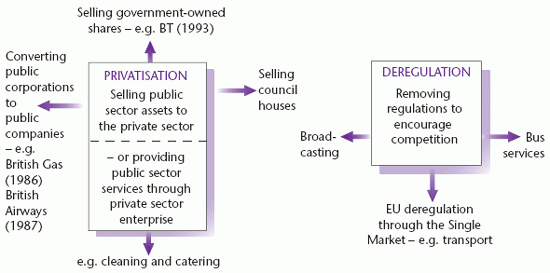The Public Sector
After studying this section you should be able to
- describe the nature, operation and control of a public corporation
- compare and contrast the benefits and drawbacks associated with (a) nationalisation and (b) privatisation
Public corporations, nationalisation and privatisation
Public corporations have a separate legal existence through the Act of Parliament creating them. Their assets are owned by the state on behalf of the community. Their objectives, whilst influenced by commercial considerations, often emphasise social aspects. They normally have financial targets to achieve, such as a target return on capital employed.
A public corporation is controlled:
- by its government minister and through a board appointed by the minister;
- by a consumer council protecting the consumer interest;
- through being audited by the Competition Commission.
Nationalisation takes an industry into public ownership. Industries such as coal, gas and the railways were nationalised following the Second World War. By the end of the 1970s, however, many nationalised industries were regarded as inefficient and over-subsidised monopolies, lacking competition and being in a position to exploit their monopoly status. The government’s response was to privatise – return to private ownership – most nationalised industries.
A July 1999 White Paper gave the Post Office greater commercial freedom to do business, operating as a PLC whilst remaining in the public sector (the government owning all the shares). The White Paper proposed to cut its monopoly on letters from items costing £1 or less to items costing 50p or less; in return, the Post Office will be able to keep far more of its profits to invest in improved services.
KEY POINT: A criticism of recently privatised industries is that their monopoly power may still remain. These ‘privatised monopolies’ are therefore regulated by ‘watchdogs’, e.g. OFGAS (gas), OFTEL (telephones) and OFWAT (water).
Other criticisms include:
- Privatising ‘natural monopoly’ industries may mean losing economies of scale.
- Private monopolies are likely to be less well regulated than public sector ones.
- Revenue from state-owned assets has been used for government current expenditure rather than for long-term investment.
Deregulation has also been used by the UK government (and the EU) to stimulate competition. Examples include transport services, and broadcasting.
Recent privatisation in the UK includes:
- 1979 BP
- 1981 British Sugar
- 1983 Forestry Commission
- 1984 Sealink
- 1988 British Steel, Rover
- 1990/91 Electricity (supply and generation)

